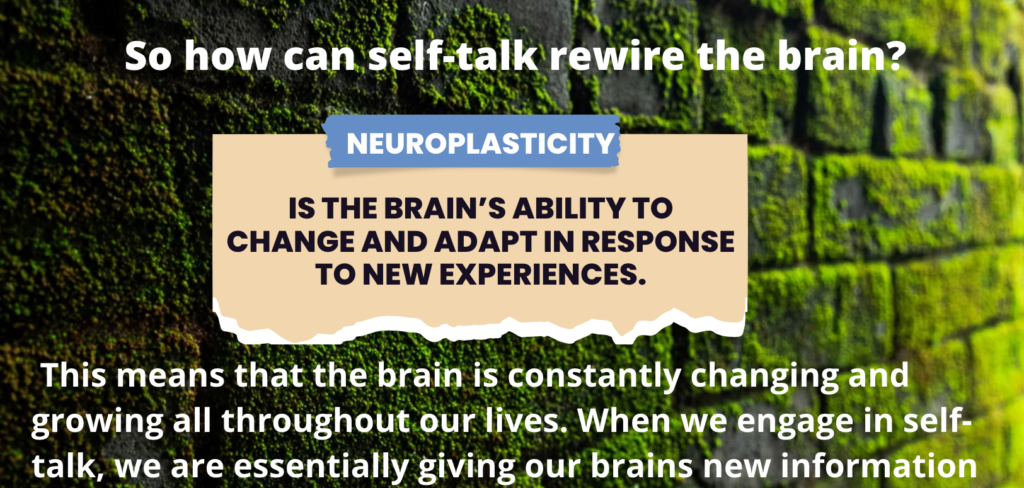The mind has been described as being like a drunken monkey constantly distracted by thoughts and emotions. The good news is that we can train this monkey to be more useful and less of a nuisance. One way to do this is through self-talk.
Let me share a phrase created by Émile Coué in 1920’s and published in his masterpiece Self Mastery Through Conscious Autosuggestion, which helped thousands of patients get better by the power of autosuggestion.
“Every day, in every way, I am getting better and better” – Émile Coué.

Autosuggestion:
To change the unconscious, Coué developed a technique he called autosuggestion, in which you give a self-induced suggestion to your brain.
If you are trying to lose weight but your mind is visualizing eating all the time, the outcome is not difficult to guess. So the first step is to view your eating visualizations consciously in a negative light(bad for health) which then gets into your subconscious mind.

and right side to avoid till goals are achieved
What is Self Talk:
Self-talk is our inner monologue, chat within our consciousness, and can be positive or negative. It is generally thought to be a mix of conscious and unconscious beliefs and biases that we hold about ourselves and the world. Among different types of intrapersonal communications are:
i) Silent self-talk (inner speech)
ii) Vocal self-talk (outer speech)
iii) Self-statements (can take the form of affirmations or mantras)
iv) Internal dialogues (2 way)
v) Auditory imagery (Auditory imagery is a form of mental imagery)
What are some examples of negative self-talk to be avoided:
- Worst-Case Scenario Thinking – anticipating the worst
- Critical Thinking – if negative this can lead to self put-downs and a feeling of incompetence.
- Catastrophic Thinking – inflates matters in the worst possible light. This type of thinking heightens anxiety and mental health problems.
- Perfectionistic Thinking – an individual constantly strives to meet incredibly high standards, often to the point of exhaustion. Perfectionistic thinking is often seen as a difficult partner, as it can be very critical and hard on oneself.

Cognitive Behavioral Therapy (CBT) – Perceptions we form and core beliefs we carry:
By Judith S. Beck (PhD), a New York Times bestselling and author of ‘Cognitive Therapy’:
Cognitive Behavioral Therapy (CBT) is a model that states that an individual’s well-being depends on the perception of events. A situation in itself is not what makes people feel bad but the way the situation is perceived. This may trigger automatic thoughts which can be positive or negative, constructive or bad.
Core beliefs are the most central ideas an individual has about themselves which they see as absolute truth. Core beliefs are almost all-encompassing, they stretch over much of an individual’s self-image and formulations can be everything from “I am not good enough” to “No one likes me”. The goal of CBT is to help rationally process automatic thoughts and disprove them.

Neuroplasticity is the brain’s ability to change and adapt in response to new experiences. This means that the brain is constantly changing and growing all throughout our lives. When we engage in self-talk, we are essentially giving our brains new information to process. This can help the brain to create new neural pathways and improve overall functioning.
Few benefits of self-talk:
improved self-esteem
increased motivation
better decision making
improved focus and concentration
improved confidence
reduce/replace negative thoughts with positive
remove feeling of incompetence
How to practice self talk:

Coué method – Repeat a phrase twenty times just before falling asleep at night and twenty times just when waking up in the morning. Make sure to structure your self-talk/phrase to be effective for you.
Top 5 highly recommended books:
We talk to ourselves all of the time, usually without realizing it. And most of what we tell ourselves is negative, counterproductive, and damaging, preventing us from enjoying a fulfilled and successful life. But with Shad Helmsetter’s Five Levels of Self-Talk (Negative Acceptance, Recognition and Need to Change, Decision to Change, The Better You, and Universal Affirmation), you can take back control of your life via this accessible yet profound technique. Amazon
Coffee Self-Talk is a powerful, life-changing routine that takes only 5 minutes a day. What if you could wake up every morning feeling more incredible than ever before… in 5 minutes? Living the most epic life! Your mind mastered! Your life on a path to shimmering happiness! Amazon
The moments before you fall asleep are a profound time to reinvent yourself. Change what you say before bed, and your life will never be the same. With Pillow Self-Talk, you’ll discover a powerful ritual to help you manifest your dreams, reach your goals, find peace, relaxation, and happiness… all while getting the best sleep ever! Amazon
In The Power of Neuroplasticity, Shad Helmstetter, PhD, presents the scientific discovery that the thoughts we think physically rewire and reshape our brains and change our lives. Dr. Helmstetter shows how to use the latest research from the field of neuroscience to wire your brain to change attitudes, overcome negativity, improve health and fitness, reach personal goals, increase mental sharpness and clarity, improve usable IQ, super-charge your thinking, and reshape your life, all with neuroscience on your side. Amazon
Embracing Your Inner Critic: Turning Self-Criticism into a Creative Asset – Hal and Sidra Stone are the creators of “Voice Dialogue” process, a therapy that transforms the inner critic from crippling adversary to productive ally. The inner critic. It whispers, whines, and needles us into place. It checks our thoughts, controls our behavior, and inhibits action. It thinks it is protecting us from being disliked, hurt, or abandoned. Instead, the critical inner voice causes shame, anxiety, depression, exhaustion, and low-self-esteem. It acts as a powerful saboteur of our intimate relationships and is a major contributor to drug and alcohol abuse. Amazon





